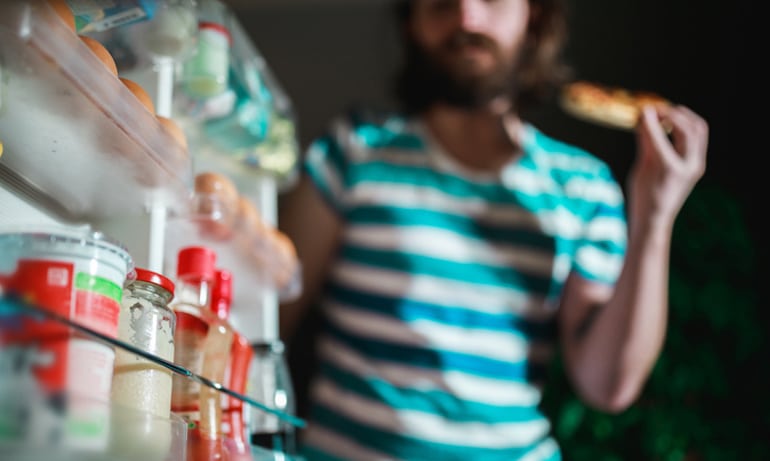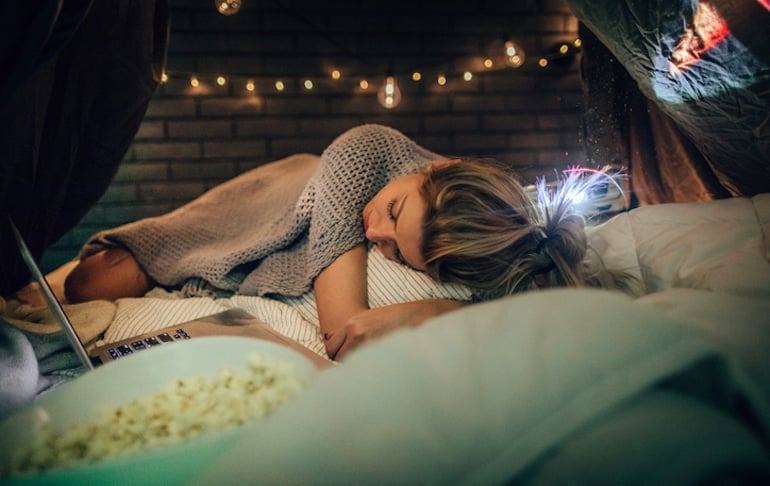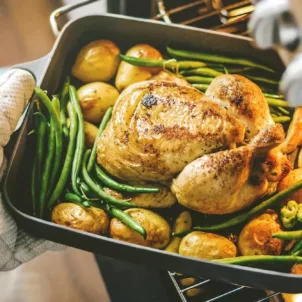If You’re a Serial Late-Night Snacker, Read This
Determined to learn how to stop snacking at night? Experts share the causes and side effects of eating late at night. Plus: 6 tips to curb even your strongest late-night cravings.
I’m the ultimate nighttime snacker, and I always have been. I joke that in my case, midnight snacks could be more accurately called 2 a.m. snacks—which also speaks to my perpetual night owl persona. Needless to say, I have work to do on both fronts.
However, it turns out that I’m not alone. A projected 71 percent of adults regularly snack late at night, with the late-night food window starting around 9 p.m. But what’s all this after-hours grazing doing to us? And what causes these late-night cravings to begin with?
To find out how to successfully stop snacking at night, I sought answers from a psychologist and two registered dietitians.
Why Do I Snack at Night?
Perhaps surprisingly, some people may be predisposed to midnight eating. Seth J. Gillihan, PhD—a clinical psychologist based in Ardmore, Pennsylvania—explains that biological and epochal lifestyle changes largely factor in.
“Night eaters tend to have less of a nighttime rise in melatonin (which signals that it’s time to sleep) and leptin (which turns off hunger signals),” he begins. Then, Brooklyn-based nutrition expert Maya Feller, MS, RD, CDN, notes that widespread developments in modern living also influence hunger cues in a variety of ways.
“With the transition from more rural to urban living, people were able to extend their productive daytime hours into the nighttime using artificial light,” she explains. “This shift in productivity schedules has had negative impacts on our circadian rhythm, disrupting our own biological clocks.” On the same note, when we’re used to working and being engaged around the clock, nutrition patterns will likely take a hit—with consistent cravings as one potential consequence.

Additional Causes of Late-Night Cravings
Here’s a closer look at what may be provoking your midnight snacking habit.
Your Internal Clock
Mia Syn, MS, RDN—an on-air nutrition expert based in Charleston, South Carolina—cites a 2013 study showing that the body’s internal circadian rhythm triggers nighttime cravings. According to this research, the urge to snack (particularly on sweet, starchy, and salty foods) typically kicks in around 8 p.m.
“While this may have helped our ancestors store energy to survive periods of food scarcity, those late-night snacks may result in weight gain over time,” Syn says. This possibility is particularly pressing when high-calorie foods are readily available, both in all-hours markets nearby and especially if you stock less-than-healthy foods at home.
Conversely, Feller notes that morning is when cravings and hunger are lowest. She also adds that circadian rhythm disturbances not only influence your perception of hunger and satiety but also contribute to:
- Fatigue
- Trouble sleeping
- Mental health issues
Dieting and Blood Sugar Imbalances
If you rigidly watch what you eat during the day only to get ravenous come nightfall, you may eventually cave into hunger pangs. These patterns can extend to extreme dieting, as well as your eating patterns as a whole.
Simply put, blood sugar is the body’s primary source of energy. When you skip meals or don’t follow a consistent eating schedule, low blood sugar and consequent late-night cravings often result.
“Strict dieting, in particular, can trigger near-constant hunger, which gets harder to resist the longer we hold out,” Gillihan explains. Further, he says that our willpower is often lowest late at night, which can have you reaching for indulgent midnight snacks to stop your stomach from rumbling.
Emotional Responses
A variety of emotions and feelings can lead to night eating, ranging from stress and loneliness to sleepiness and sheer boredom. “We turn to food as a distraction to help us cope with stress and worry,” Gillihan shares. Plus, we may be drawn to certain comfort foods as a result of deeper emotional responses, such as “ones we associate with Mom’s love and care.”
Essentially, late-night eaters may seek pleasure in snacking to combat negative feelings. Gillihan explains that acquiescing to your cravings “activates the brain’s reward center by causing the release of dopamine,” which is commonly referred to as the feel-good hormone. He says that we also often grapple with an internal dialogue to coax us into satisfying our cravings. “We believe the stories our minds tell us, like, ‘You deserve to treat yourself,’ or ‘Just have one piece of cake.'”

Is It Bad to Eat Late at Night?
Before we get to the consequences of eating late at night, is doing so always “bad”? After all, we know that dinner should be your smallest meal of the day to regulate hunger hormones and support weight management.
But Syn clarifies that eating late can be fine, as long as:
- It’s occasional, rather than habitual
- You choose nutritious options
- You stay within your recommended nutritional and caloric needs for the day
Further, Feller adds that some people may actually benefit from having a small snack before bed. “If you regularly wake up hungry in the middle of the night, you may be experiencing a drop in blood sugar that causes a startled wake-up,” she explains. If you’re in this boat, then a healthy bedtime snack may actually prove to be beneficial. Pro tip: Potatoes are one of the best bedtime snacks, as they contain an optimal balance of nutrients and complex carbohydrates that help stabilize blood sugar and prepare the body for sleep.
Note: Deprivation is never the way to go. When you’re hungry, you’re hungry; nourish your body with nutritious foods accordingly.
Side Effects of Eating Late at Night
If your nighttime eating patterns veer more compulsive than constructive, you may experience some of the following undesirable side effects.
Weight Gain
First, if you hope to prioritize weight management, grazing or overeating at night will likely work against you. According to Gillihan, research shows that “increasing the fasting window between dinner and breakfast leads to better regulation of our weight—even if we consume the same number of calories.” (Hence why intermittent fasting is an increasingly popular tool for weight management.)
In short, if you minimize your overnight fasting window by snacking well after dinner, you’ll be less likely to attain or maintain your weight goals.

Disrupted Sleep
While a lack of quality sleep can cause cravings, the inverse is also true. Feller shares that late-night eating can be linked to disrupted sleep patterns. “A study found that having a high food intake close to bedtime is associated with decreased sleep efficiency in healthy participants,” she explains. It also found that meals with a high fat content appear to decrease REM sleep. “Heavy foods close to bedtime can disrupt our sleep because digestion and sound sleep are incompatible,” Gillihan adds.
Digestive Issues
Digestive issues are another consequence of late-night snacking. Feller says that we have a tendency to lie down after eating late at night. However, reclining while your stomach is full can potentially increase GI discomfort. “When the body is in a relaxed and horizontal position, contents of the stomach are able to flow back up into the esophagus and cause acid reflux,” she shares. Heartburn may also result.
Poor Sense of Self
Lastly, your mental health may suffer if you regularly overeat at night but want to stop. “Many people find it demoralizing to watch themselves break their diets at night, or eat foods they promised themselves they wouldn’t,” Gillihan explains. Such feelings of defeat and failure can instigate:
- Negative self-talk
- Low mood
- Additional mental health struggles
Further, he says that the highly processed, high-sugar foods we’re largely drawn to late at night are associated with negative effects on mental health, thus doubling down on the potential for mood disturbances.

How to Stop Snacking at Night
Wondering how to curb your appetite at night? If you’re committed to kicking your late-night snacking habit, follow some of these expert-advised tips.
1. Eat Balanced Meals
While it seems like a no-brainer, Feller advises making sure you eat enough throughout the day to consistently give your body the energy and nourishment it needs.
“Spend time planning ahead and grocery shopping for nutritious meals and snacks to enjoy throughout the week,” Syn adds. “Focus on foods that are high in protein and fiber to help you feel satisfied for longer.”
2. Clear Your Home of Tempting Midnight Snacks
This point seems almost too simple, but it’s more effective than you may imagine. “Keeping high-temptation foods out of the house raises the ‘cost’ of getting the food,” Gillihan explains. “We might be willing to walk to the fridge, but getting in the car and driving to the grocery [may not be] worth the trouble.” In short, when it comes to stopping food cravings at night, inconvenience is your ally.
3. Stock Up on Healthy Alternatives
One of the best ways to stop late-night snacking? Keep nutritious bites on hand. If midnight snacking is your Achilles heel, opt for healthy alternatives to replace the go-to foods you crave. Healthy swaps could include:
- Whole fruit instead of candy
- A handful of nuts instead of a bag of chips
- Antioxidant-rich dark chocolate instead of milk chocolate
Sometimes, Gillihan says that herbal tea could curb your cravings at night. And yes—he understands that it’s not a totally comparable substitute for, say, a slice of pizza. “Practice accepting that it’ll be a different experience, he advises. “Make it as enjoyable as possible as you give the alternative your full attention.”
4. Practice Intuitive Eating
The practice of intuitive eating—which focuses on emotion, rationale, and instinct to unlearn unhealthy eating habits—is another method that can help you stop snacking at night. When you listen to your mind and body, you’ll begin to improve your relationship with food and understand lingering patterns. Syn says you may even realize that you’re not even hungry to begin with, and instead realize that you’re bored, stressed, or simply habituated to late-night snacking.
Then, if the thought of not satisfying your cravings puts you on edge, Gillihan suggests mindfully working through the stress. “Breathe through the cravings,” he says. “Remind yourself that [mild] hunger won’t hurt you and that the urge to eat comes and goes. Watch it rise and fall as you keep doing whatever you’re doing.” Checking in with yourself with honesty and compassion is key to eating intuitively.

5. Switch Up Your Routines
More specifically, change the routines that often lead to late-night eating. “Maybe reading is less likely to trigger nighttime cravings than watching TV,” Gillihan explains. This tip is especially helpful if food commercials kick your cravings into gear, or if you’re used to eating in front of screens.
Otherwise, if stress is your trigger for night snacking, Feller says “it may [grow into] an opportunity to work on behaviors to reduce stress.” During the daytime, you may want to exercise more as a healthy outlet to combat stress. You can even add more stress-reducing foods to your diet.
6. Get Enough Rest
Wondering how else to curb hunger at night? Rest is the answer. Given the link between sleep and late-night snacking, prioritize quality sleep.
“Adequate sleep is important for aiding glucose metabolism and regulating hunger and appetite hormones,” Syn shares. “Tiredness can also be mistaken for hunger.” If you hit the hay earlier and follow calming bedtime rituals, you’ll not only have a shorter snacking window but also inhibit nighttime cravings from arising in the wee hours.
How to Stop Snacking at Night FAQs
1. Why is late-night snacking bad for you?
Late-night snacking can disrupt your sleep, lead to weight gain, and negatively affect digestion, as your body isn’t as efficient at metabolizing food during sleep.
2. How can I stop snacking at night?
Try establishing a consistent bedtime routine, staying hydrated, and eating balanced meals throughout the day to prevent nighttime hunger.
The Takeaway on How to Stop Snacking at Night
While night eating can get in the way of your health and wellness goals, know that it doesn’t have to. Above all, balance, a healthy relationship with food, and self-kindness are essential to successfully stop snacking late at night.
Remember: It takes time to form healthy habits that stick. If you eat a midnight snack every so often, don’t beat yourself up. Simply try your best the next day and the day after. “Ultimately, honoring your body while listening to your internal hunger and satiety cues can serve as a guide for food choices throughout the day, as well as late at night,” Feller says.











